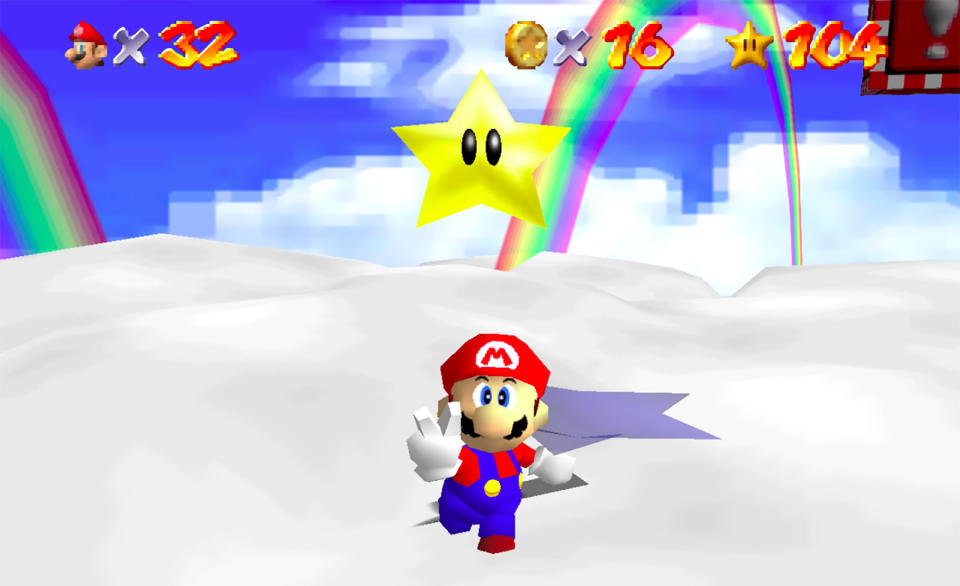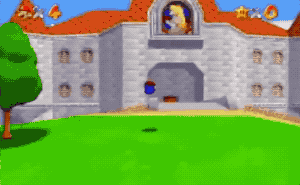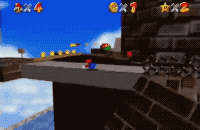The life of an elite 'Super Mario 64' speedrunner
Allan Alvarez can get 120 stars in 99 minutes (and 28 seconds).
Allan Alvarez can complete the game Super Mario 64 faster than anyone in the world, which means that most days he gets out of bed around 4 PM.
Afternoons consist of errands -- lately, finding a new apartment and office space with reliable internet for streaming -- and training with his volleyball team. After dinner, he does a few rounds of arm and finger stretches, makes sure he's hydrated, then turns on the Nintendo 64 to practice. At around midnight in Spain -- 6 PM on the US East Coast and thus peak viewing hours -- he starts streaming on Twitch under his alias cheese05. His shift often wraps up close to 7 AM.
Alvarez is a full-time speedrunner; he competes with others around the world to beat a game in the fastest time possible. His primary game, the classic platformer Super Mario 64, is the most popular for speedrunners. Alvarez holds the world record for beating it: 120 stars, which essentially means conquering every goal in the game. It takes the average gamer about 24 hours to do this, according to HowLongToBeat.com, an online database of game lengths. Alvarez has done it in 1 hour, 39 minutes and 28 seconds, including cutscenes.
Now 22 years old, Alvarez first found speedrunning videos while grazing YouTube in Trinidad, where he grew up. He tried it himself in 2014, around the time of his senior high school exams. Then, in the days after graduating from school, he began streaming his Mario 64 speedruns every night on Twitch, pulling in about $100 or $200 per month. In only a year, Alvarez got his first world record and landed $1,000 in donations that day. Today, he streams five to six days each week, earning about $2,500 per month from Twitch alone.
"Mario has reached a point where it's so optimized and so difficult that I feel like I can't possibly try any harder and I just can't get anything going."
"Everyone says that I'm the fastest improver of all time," he said. "When you have the world record in the most famous speedrun there is, you get famous, and I started making money. And then it started becoming my job."
His job has felt tiresome lately. Since its release two decades ago, Mario 64 has been played and replayed to the point where eking out a new, faster time seems nearly impossible. "Mario has reached a point where it's so optimized and so difficult that I feel like I can't possibly try any harder and I just can't get anything going. I spend hours trying to get a run going and I just can't and I get frustrated," he said.
Alvarez has clocked more than 5,000 hours of playtime in a single game -- probably tens of thousands of semifinished runs. His closest rival, 23-year-old Devin Blair from Kentucky -- aka puncayshun -- said he's played about the same amount. Steffen Hagelskjær, a 22-year-old from the small city of Viborg, Denmark, known as flippy_o, places himself around the 3,000-hour mark on Mario 64. "I almost feel bad saying that, because I know that I could've spent so much more time in the game," he said. "I could spend three times that amount and probably still not be bored."
Hagelskjær peaked at No. 11 on the world leaderboards for Mario 64 but lately has gone down to No. 19, about four and a half minutes behind Alvarez. When he started, he streamed up to 14 hours per day.
"Let's say that I did get bored with 9,000 hours. Then there would be another game I could spend 10,000 hours in and not get bored," he said. "As long as you like video games and as long as you like the concept behind speedrunning, it's hard to fade out on it completely."

How many times have you beaten your favorite game?
Three or four may be a lot, yet high-level speedrunners will easily clear that many playthroughs in a night. Their craft takes an absurd level of persistence and perfectionism, mastering a specific sequence over thousands of hours. Yet speedrunning has never been more popular.

"It's really done nothing but go up," said Anil Chirayath, a community program manager at Twitch who essentially acts as a liaison between speedrunners and the streaming company.
Speedrunning dates back to the days where players mailed VHS tapes corroborating their times to games magazines, but a shift took place around five years ago. The rise of streaming platforms like Twitch meant records were broken in real time to captive audiences. Where each game series might have had its own record keeping in Google Docs, sites like speedrun.com emerged to centralize leaderboards across genres, vetted by thousands of volunteer moderators. Meanwhile, live events like the yearly European Speedrunner Assembly and twice-annual Games Done Quick marathon drive more attention to the competition.

In 2014, a Games Done Quick event pulled in more than 100,000 viewers on Twitch. "Once you get to that level of exposure, I think that signifies that speedrunning has arrived on the scene," said Chirayath, who himself speedruns NES game Mike Tyson's Punch-Out!! blindfolded. Today, the same event can get more than 9 million unique viewers over the course of a week.
The rise of esports has also helped legitimize watching video games, not just playing them, for entertainment. Yet while competitions for Starcraft or DotA are analogous to soccer or tennis -- competitions where you face off directly against others -- speedrunners are more like weight lifters or gymnasts. They compete alone, in nearly the same single-player environment each time, trying merely to master their own exacting standards. While speedrunners compete with one another, their aim is also to bust personal mental plateaus. And ultimately, all of them are competing on the same side against the game's architecture.

"The shared mindset is kind of that you want to push the game as far as possible," said Hagelskjær. This has created a collaborative community that shares time-saving game glitches widely instead of hoarding them for themselves. "If everyone knows the same things it's more about who's the better player rather than who found something that he didn't share with anyone else. It's almost seen like a scumbag move if you don't share something these days."
Because speedruns are usually streamed, any accidental glitches don't remain secret long anyway. The bane of casual gamers, these bugs are integral to speedrunners, who hunt for and exploit them to get from A to B more quickly than the game's creators intended.
"Nine times out of ten, doing the tricks and glitches takes more skill than not doing them."
"You're hardly ever going to find someone who actually speedruns who tells you glitches are bad," said Summoning Salt, the alias of a video maker who documents speedrunning records on YouTube as a kind of community historian. "Nine times out of ten, doing the tricks and glitches takes more skill than not doing them."

A finesse in even the trickiest of techniques makes top speedrunners popular on Twitch. Runners mainly make income from subscribers who pay monthly and individual donations. Professional speedrunners thus need to be internet personalities too. They comment on their moves to educate viewers on their strategy and how to execute tricks. They joke with their audiences and talk about what they had for dinner during cutscenes or in the seconds between restarting aborted runs.
On one level, the enjoyment of following speedrunners is that of seeing a live drama: players who want to reach their goals, face continuous setbacks, improve their skill and maybe, eventually, conquer a record. Audiences get invested in players they're rooting for.
Another reason for its popularity is nostalgia. "People always have a place in their heart for the old games that they used to play when they were young. I don't think that ever goes away," said Chirayath. Watching speedruns is a way to enjoy them without the labor of playing them through. It means getting to vicariously re-experience the games of one's youth in a new light, through the eyes of an expert.

There are certain games that speedrunners gravitate toward, like The Legend of Zelda: Ocarina of Time, Super Metroid and Portal. Many of them are older titles and involve puzzle or platforming elements. They not only hold sentimental value but also, unlike modern games, waste little time with storyline and dialogue. "If you're going to be playing a game and resetting 100,000 times, then it's easier without those cutscenes and opening intros," said Peter Anthony Chase, aka "Pac," the founder of speedrun.com.
Super Mario 64, however, is the most played game on Chase's site. For all the anticipation around the upcoming Super Mario Odyssey (Alvarez says he's "definitely" going to play it), Mario 64 has remained king of speedrunning games despite the many Mario titles that have emerged over the past 20 years.
One of the first 3D platformers, it combines varied puzzles with multiple paths to collect stars, the goal of the game. It's also an iconic game worldwide, drawing a high standard of global competition: The top 15 players in the 120-star category represent five continents and 10 different countries. Moreover, it's the right length for speedrunning. A 120-star playthrough might take two hours, but shorter routes that rely heavily on glitches can be finished in under 20 minutes (the record for a 0-star run is 6 minutes 44 seconds).
At this stage, there are few fresh tricks to find in Mario 64 -- a YouTuber even offered $1,000 in 2015 to anyone who could replicate an apparent new glitch. With the margins for winning now so narrow, the emphasis for 120-star Mario 64 speedrunners is all on execution, with players mostly hemming close to the known optimal path through the game.
In 2006, the record for the most challenging, completionist 120-star category was 2 hours, 10 minutes and 40 seconds. In 2012, speedrunner Siglemic vowed to stream 12 hours per day for a month to bring the record down, according to Summoning Salt, a position he mostly held until 2014, when he lost it to Blair. Since Alvarez took the title in 2015, he and Blair have been trading top honors.
In May this year, Alvarez beat the 1:40:00 mark for the first time ever. A month later, Blair beat his record by eight seconds. The very next day, Alvarez made a run to reclaim the title.

The world-record run
Multiple speedrunners describe Mario 64's appeal in terms of its movement, and watching Alvarez's world-record attempt from this June is simply aesthetically pleasing. Like a portly gymnast, Mario somersaults, long jumps and dives gracefully from platform to platform in Alvarez's hands, every next move seamlessly anticipated. He confidently pulls off glitches like the backward long jump and precisely locates a star hidden behind a wall.
About an hour into his run, Alvarez goes upstairs in Peach's castle, a marker that he's entering a second phase of the game. Seeing that he's on track for a world record, Alvarez gets nervous.
In an earlier run, he'd gotten to the last stage, a face-off with Mario's nemesis, Bowser. The game's final challenge is to pick him up by the tail, swing him in circles like in an Olympic hammer throw and hurl him into bombs dotted around the area. Missing your throw costs about 15 seconds of game time, and Alvarez had lost a record by missing twice in a row.
This time Alvarez keeps his nerve. At the second Bowser hits the final bomb, his expression goes from impassive concentration to the kind of involuntary release of adrenaline and relief you see in tournament-winning athletes as he jumps up and down. For now, he holds the world record: 1:39:28.
When asked to describe Alvarez, Blair said he "really thrives off of competition, probably more than anyone that I know."
"Some people lose a world record and they feel demoralized, but Cheese is the complete opposite. He just has what I'd call a champion's mind-set," Blair said, using Alvarez's Twitch screen name. "Whenever I take a world record from Cheese, the first thing he's going to do is grind till he takes it back."
Alvarez, who got into speedrunning Mario 64 from watching Blair's videos and said they're pretty much best friends, agreed. "Most speedrunners want to play just because they love playing video games," he said. "I always had a competitive mindset. I always wanted to be the best." He'd never even gotten 120 stars in Mario 64 until he started speedrunning.

Playing soccer as a kid, Alvarez would juggle the ball a thousand times and do a thousand passes against a wall every day, on top of playing tennis and volleyball. "I know what it takes to practice the same thing over and over to get better and better," he said. "That's exactly what speedrunning is, except it's all mental instead of physical."
Speedrunning is a kind of gaming purism: no pesky narrative nor immersion, just sheer technique. All destination, no journey. Watching the best speedrunners ply their trade is like watching an athlete pull off a feat so sublime that it expands your conception of the possible. Over time, competitors get closer and closer to perfection, honing their skills to be almost machinelike.
Except elite speedrunners aren't machines. They choke at critical moments; they may wake up one morning and not want to work. So as in the upper echelons of many competitions, resilience separates the great from the good. "There's times when no matter how good you are, you're just going to mess up, because it's so hard. But the more you get there, the more comfortable it's going to seem," said Summoning Salt. "You've got to just be used to being able to hit the reset button."




